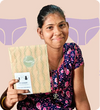Traditional Wisdom and Menstrual Wellness
Makar Sankranti/ Baisakhi/Vasant Panchmi – call it what you will, it is that perfect time of the year when winter’s chill starts to ease, and the season’s warmth & treats are everywhere!There’s more to these festivals than bonfires & sesame treats. The foods we eat during Sankranti, like til-gur laddoos and khichdi, are steeped in traditional wisdom that goes beyond taste—they nurture our bodies, including menstrual health! 1. Til-Gur: A Winter Superfood for Hormonal Harmony 🌞 Sesame seeds (til) and jaggery (gur) are the season’s culinary stars, and for good reason. They are rich in calcium, magnesium, and zinc—all crucial for supporting hormonal balance and easing PMS symptoms. Jaggery, on the other hand, is a natural sweetener packed with iron, which helps combat anemia—a common concern during menstruation. Plus, its magnesium content can help soothe cramps. Together, they’re like a tag team for menstrual wellness, ensuring your body gets both energy and vital nutrients! ✨ Cycle Tip: Snack on til-gur laddoos during your luteal phase (PMS week) to curb cravings and boost your mood. 2. Khichdi: The Ultimate Comfort Food for Your Gut 🍚 Khichdi, a humble mix of rice, lentils, and spices, is a staple that’s as easy on your tummy as it is on your taste buds. Its light, nutrient-dense profile supports digestion, which can often take a hit when it's cold & also closer to your period. The turmeric in khichdi reduces inflammation as well — great for soothing those dreaded cramps. ✨ Cycle Tip: Cook khichdi during your period for a gentle, warm meal that feels like a hug for your insides. 3. Ghee: The Unsung Hero of Menstrual Health 🧈 No harvest-season dish is complete without a drizzle of ghee. This golden elixir isn’t just delicious—it’s packed with healthy fats that support hormone production and keep your energy levels steady. Ghee is also known for its grounding properties in Ayurveda, helping to calm the mind and reduce stress. If your period leaves you feeling frazzled or fatigued, ghee might just be your best friend. ✨ Cycle Tip: Add a spoonful of ghee to your khichdi or laddoos for an extra boost of nourishment. 4. Chikki and Revdi: Sweet Treats with a Purpose 🍬 Chikki (a brittle made with peanuts and jaggery) and sesame revdi are classic sweets that double as nutrient powerhouses. Peanuts are high in protein and magnesium, supporting muscle relaxation and reducing bloating, while jaggery keeps your energy levels stable. These snacks are proof that indulgence & health can go hand-in-hand! ✨ Cycle Tip: Enjoy chikki during your follicular phase (the week after your period) for a burst of energy to kickstart your month. Traditional Wisdom Meets Modern Wellness The harvest-season foods aren’t just festive treats—they’re ancient solutions to modern health concerns, including menstrual wellness. By eating seasonally & embracing nutrient-rich dishes, you’re nourishing your body in harmony with nature and tradition. So, as you savor that til-gur laddoo or warm bowl of khichdi this Sankranti, remember: you’re not just celebrating a festival—you’re honoring your body’s needs. 🌟
Learn moreDebunking period taboos around the world
Menstruation myths have been pulling the strings on how women navigate festivals across cultures for ages. 🤧 From being told to skip the temple to steering clear of the kitchen, period stigma only worsens the discomfort. It's mind boggling how universal this experience is for women! But we’re here to bust these taboos and break the cycle—because it's time to flow freely without the nonsense! 💪🏼 🩸India: “Impure" Blood Myth: In India, menstruation myths run rampant, especially during religious festivals like Diwali, Navratri, or Durga Puja. Women are often told they can’t enter temples or take part in rituals while on their period because they’re seen as "impure." 😖 Reality Check: Let’s set the record straight: menstruation is a natural bodily function, not a spiritual disqualifier! Thankfully, more people are calling out this nonsense, and movements across India are working to flush out these outdated beliefs. 😮💨 ✨Nepal: Chhaupadi Myth: Chhaupadi – Menstruating women are banished into isolation, often sent to unsafe huts, claiming that periods bring bad luck and impurity. 😵 It’s practised particularly during Tihar. Reality Check: Chhaupadi is illegal, but it’s still happening in some rural areas. Activists are fighting hard to put this harmful practice in the past, because isolating women in unhygienic sheds is not just unfair—it’s downright dangerous. The idea that periods bring misfortune? Total myth. ❌ 🪭Japan: Jinxing Sumo Myth: Menstruating women can jinx Sumo wrestling matches during festivals like Obon 👀 Reality Check: These ideas are ancient, but that doesn’t make them accurate. Periods don’t affect luck, wrestling, or festivals! Younger generations are stepping up and challenging these backward superstitions—because it’s high time women fully enjoy these traditions without fear of being bad luck charms! 🪽 🌙Middle East: Menstruation and Ramadan Myth: In many Middle Eastern countries, women on their periods are told they can’t pray during Ramadan, since menstruation is considered a ‘time of impurity’ (see a pattern?). While skipping fasting is allowed, the stigma around periods often makes women feel ashamed for menstruating during holy days. 😓 Reality Check: Yes, religious texts may grant women a pass on fasting during their period, but that doesn’t mean they’re any less spiritually worthy. Let’s drop the shame and understand that periods are just another part of the natural cycle of life. 🌀 🎊Africa: Exclusion from Festivals Myth: Menstrual blood is 🚨"dangerous”🚨 – weakening men/warriors, affecting fertility or the health of their harvest. They were also considered to reduce the potency of spiritual practices. 🫤 Reality Check: These beliefs are rooted in ancient superstition (if warriors didn’t give that away), not science. Back then, menstrual blood was considered “mystic” – there was little scientific awareness. Activists across Africa are working to shift this narrative and ensure women are welcomed in every aspect of cultural life—no matter what time of the month it is! 🩸🩸🩸 🌱It’s Time for Change Festival season shouldn’t come with a side of exclusion! Period myths are being 🔨smashed🔨 from India to the Middle East, as women reclaim their right to fully participate in cultural life (as they should!!!). ⚡ The takeaway? Menstruation is natural, and women have no reason, backed by science, to be sidelined during festivals—or any other time! Ditch these outdated taboos and make sure to celebrate without shame – you have every reason to! 🥳 Sources: https://pmc.ncbi.nlm.nih.gov/articles/PMC4408698/ https://www.mdpi.com/2077-1444/12/9/749 https://www.worldbank.org/en/topic/water/brief/menstrual-health-and-hygiene https://www.weforum.org/agenda/2016/05/menstruation-myth-why-are-african-women-still-paying-for-it/
Learn moreWhy Talk Red to Your Dad
In many households, conversations about periods are often left to mothers and daughters. However, it’s essential to break down these traditional barriers. Here’s why you shouldn’t feel awkward mentioning periods to your dad. There is nothing to be hush about 🤫 Menstruation is a natural biological process that all womankind experience. There’s no secrecy or need to treat periods as something shameful. Normalizing conversations about periods with all family members, including dads, helps to break the stigma and makes it easier for everyone to address menstrual health openly and honestly 🫂Better Communication & Connection Open communication within a family strengthens relationships, by strengthening empathy. When you feel comfortable discussing periods with your dad, it encourages a more inclusive and supportive relationship. It allows him the opportunity to empathize & provide you with better support when needed. This openness can extend to other important topics, fostering trust and mutual respect. 🩸Educating Dads on Menstrual Health Many fathers may not have had the opportunity to learn much about menstruation. By talking to your dad about your period, you’re not only educating him but also helping him become a better ally and advocate for menstrual health. This knowledge can be beneficial for him to support you and other family members more effectively. 💪🏼Empowering Daughters and Fathers Alike Breaking the silence around periods empowers both daughters and fathers. For daughters, it reduces feelings of shame or embarrassment. For fathers, it provides a chance to demonstrate their care in yet another important aspect of their daughter’s life. 🤫Breaking Down the “hush-hush” By having open conversations about periods with your dad, you contribute to breaking down outdated gender stereotypes. It challenges the notion that periods are a “woman’s issue” and shows that men can be informed and supportive parents in menstrual health. The onus need not fall all on the mother. ❗Practical Tips for Starting the Conversation If you’re unsure how to bring up the topic of periods with your dad, we have suuuper helpful tips for you: 👉🏼Start Simple: Begin with basic information and gauge his response. “Dad, I wanted to talk to you about something important regarding my health.” 👉🏼Be Honest: Share your feelings and why it’s important for you to have his support. 👉🏼Provide Context: Explain what you might need from him, whether it’s understanding, emotional support, or help in getting period products. 👉🏼Use Resources: Share educational resources or articles that can help him understand menstrual health better. 👉🏼Be Patient: Give him time to process and ask questions. It might be new for him, but with time, it will become easier. Conclusion Talking about periods with your dad may feel awkward initially, but it’s a step towards greater understanding and support within your family. Remember, periods are a natural part of life, and involving your dad in these conversations can lead to a more open, inclusive, and supportive relationship 💜 By breaking the silence, you empower yourself and those around you, paving the way for a future where menstrual health is no longer a taboo subject 🩸
Learn moreWhy Celebrate Menstrual Hygiene Day?
Roughly 70% of reproductive health issues in women are caused by poor menstrual hygiene. Menstrual Hygiene Day puts a spotlight on the need for sustainable, accessible menstrual products and good sanitation facilities, especially in low-income and rural areas where these products might not be accessible. 📖Lack of information/ Misinformation: Traditional cultural norms have often prevented open dialogues about menstruation, restricting access to crucial information about normal female bodily functions. This prevents several women (and young girls) from speaking up when going through immense pain and discomfort. Not only is information often restricted, we’ve all heard all sorts of misconceptions floating around out there – from age old taboos to outright unscientific explanations of how women's bodies work! These misconceptions can lead to discrimination and social exclusion, affecting women and girls in their education, work, and daily lives. 🏫Poor Infrastructure & Access: Managing menstrual hygiene is especially difficult for women in developing countries due to the lack of clean water and proper toilet facilities. ❗Close to 23 million girls ❗in India drop out of school each year once they start menstruating. Several girls miss school during their periods because they don't have the right facilities or fear embarrassment, since 1 in 10 girls below the age of 21, cannot afford sanitary products. The lack of access to menstrual products and hygienic facilities, creates further disparities in education and opportunity for girls. ▶️Where it all began... Menstrual Hygiene Day was initiated by the German non-profit WASH United in 2012. In May 2013, WASH United launched a 28-day social media campaign called "May #MENSTRAVAGANZA" on platforms like Twitter to raise awareness about menstruation and its importance in water, sanitation, and hygiene (WASH) development initiatives. The campaign, supported by WASH Advocates, Girls' Globe, and Ruby Cup, received positive feedback, leading to the creation of a global awareness day for menstruation (source). On May 28, 2014, Menstrual Hygiene Day was celebrated worldwide, for the first time, with various events such as rallies, exhibitions, movie screenings, workshops, and speeches. The inaugural celebration saw participation from 145 partner organisations (source). ➡️What's next? Menstrual Hygiene Day is an opportunity to acknowledge and do our bit to tackle the challenges faced by millions of women and girls worldwide 🩸Roughly 54% of menstruating women in India, do not have access to menstrual care products🩸 Not only is our period underwear a safer alternative for women with access to period care, we can leverage what we have to ensure better health & hygiene for rural communities. Additionally, our period underwear lasts 2 years, so it eliminates the worry of running out. We feel responsible to get women the period care they need. So we often partner or take on community-driven initiatives to ensure women receive the menstrual products they deserve. Check out our CSR initiatives right here. 🫴🏽What can you do? The goal is simple – to make safer, sustainable menstrual care more accessible! 🩸 We’re immensely grateful for donors who choose to donate our period underwear to underprivileged communities, rural schools, etc; making sustainable, safe period care more accessible. We also make it a point to personally visit the communities to educate – make information on menstruation & menstrual care more accessible. If you would like to make a difference, just drop us a message on +91-8454870509 :) Sources: https://toybox.org.uk/news/spotlight-on-period-poverty-in-india https://www.ncbi.nlm.nih.gov/pmc/articles/PMC4463372/ https://web.archive.org/web/20180809123231/https://www.impatientoptimists.org/Posts/2014/05/Menstrual-Hygiene-Day-A-Milestone-for-Women-and-Girls-Worldwide#.VZHNVEZKYsI
Learn moreMoon and Menstruation: A ‘Lunatic’ Belief or Powerful Connection?
Humans have always, in some form or the other, believed that the moon influences their health in ways even science cannot prove. The connection between the menstrual cycle and the lunar cycle can be found in early folklore and medicines, contemporary accounts of full moons and modern spirituality. While many scientific studies rebuke the hypothesis, the general public remains fascinated by the idea that menstruation and the moon may be linked. Why, you wonder? Let’s decode. To start off, etymologically at least the connection is clear and indubitable: the root word for ‘menstruation’ comes from the Greek word for Moon – ‘mene’ – and the Latin for month – ‘mensis’. But historically? There’s much to learn. From sleep trouble, violent behaviour, mental health to menstrual cycles, several aspects of our health have at one time or another been associated with the Moon. And it all started centuries ago. Ancient cultures, such as the Indians and Greeks, believed that the feminine energy is at the height of its power when the menstrual phases and the lunar cycle are linked. A full lunar cycle lasts from one new moon to the next and takes 29.5 days. The average menstrual cycle is also around 28–29 days long - the math is simple, go figure?! Considering this, it doesn't come as a surprise that our ancestors channelled their energies to build a deeper relationship with their bodies, minds and spirits with the help of lunar cycles. And of course, scientifically, the connection is more dubious… There’s no scientific evidence that a synced cycle with the moon is of any benefit, but folklore and alternative health advocates have persistently – and surprisingly – believed that there are benefits to menstruating during the new moon and ovulating during the full moon. And it’s not just them – the first one to suggest a connection between the two cycles was none other than the most revered man in the study of science, Charles Darwin. Since then, several researches and surveys have been done which rebuke the hypothesis as a mere coincidence. However, some believe that connection has been disrupted owing to our modern lifestyle and artificial lights. The moon’s effect on us and nature is powerful, and it wouldn’t be completely ‘lunatic’ to think that even our periods are a phenomena connected to the moon. Which is also why some people with periods try to sync their cycle to the moon. Here’s why you might want to consider it too, even if you aren’t convinced by the science: It will make you more aware of the moon and its phases. You can learn to direct your energy in specific ways throughout the lunar cycle and your menstrual cycle. Focus on building better habits such as sleeping without digital light in your room. Choose reflective and inward-looking activities during the new moon, and more social, connective activities during the full moon. Make your home a sanctuary and ground inward during the new moon. This was just a gist, there’s lots more to be understood and practised about the two cycles. Start with a few readings and then don’t forget to reflect. See you another time. Sources: https://helloclue.com/articles/cycle-a-z/myth-moon-phases-menstruation https://www.healthline.com/health/womens-health/menstrual-cycle-and-the-moon#takeaway https://pubmed.ncbi.nlm.nih.gov/16407788/#:~:text=The%20lunar%20cycle%20has%20an,correlate%20with%20the%20menstrual%20cycle. https://flo.health/menstrual-cycle/health/period/menstrual-cycle-and-moon
Learn moreTemple Taboos on Periods: Are We Sticking To Obsolete Rituals and Beliefs?
Tucked away in Kerala, the Sabarimala Temple has been a revered place of worship for hundreds of years. Recently though, it has also become a hot-topic for discussions around menstruation and feminism. Dedicated to Lord Ayappa, an eternally celibate God, the temple is only for men, disallowing any menstruating women (women between the age of 13-50) from entering the temple. In 2018, the Indian supreme court had overturned this centuries-old ban. Yet, none had been able to enter since, even with the support of Kerala’s state government and police. Those that tried were stopped, shoved and stoned by mobs of men. This sparked a row of protests, including one where over five million women lined up across the length of Kerala, a state in southwest India. Side by side, these women formed a wall stretching 620 kilometres. The case of Sabarimala Temple presents a truth that we must deal with in order to understand temple taboos on periods in India – it does not take long for rituals and beliefs to become taboos, and not all menstruation beliefs are misogynistic. Periods have always been considered divine in Indian culture. Many Hindus believe menstruating women are so pure that they’re ‘worshipped’ as a ‘living goddess’ during that time of the month. So why aren’t they allowed in temples or kitchens? Imagine the world about 500-600 years ago when women spent most of their days doing household chores, farming, worshipping and taking care of the family. The menstrual cycle was considered a divine experience for the woman, when her spiritual energies were high but her physical being needed rest. It was even believed that a menstruating woman cannot enter a temple as her energy will attract that of the murti (idol), and the murti will become lifeless. Some also believe that a woman’s energy moves downwards during menstruation, whereas energy moves upwards in a Hindu place of worship. This was also a time when people lived in forests and villages where wild animal attacks were common. Women were often asked to stay indoors and not visit temples (the most common activity that required venturing out of the house) as the smell of blood attracted animals and made them more susceptible to attacks. They could, however, pray to God, chant or meditate in their own space. With the physical body demanding more rest, women were also restricted from cooking or cleaning in the kitchen. Household chores took most of their time and energy with no days off and periods allowed for every woman to rest and recuperate during these 5 days. Sounds logical, right? So how did these logical practices turn into taboos? The answer is simple: practices that were meant to protect women began to restrict and reprimand them as people started to adopt them without knowing their significance, and when in changing times, we still stuck to age-old beliefs. The world has changed from what it was. Women no longer spend most of their time doing physical work in farms or kitchens. They may engage more in mentally strenuous activities. There are no wild animals sniffing off blood when they head out to work or to temples. Some of our practices and rituals around menstruation are nothing but a hangover of the past, a bad habit that we are not able to let go. No scripture, vedas or religious texts propose that women cannot pray on their periods, that they are impure, or that they simply cannot enter a temple or a place of worship. The idea of segregation, avoiding sex or contact, and taking ritual ‘purification’ baths are not religious customs but a result of patriarchal discomfort. When sanitary pads or tampons were not used, the sight of blood dripping from a woman’s body was discomforting for most. Over time, various spiritual and occult meanings have been given to menstruation, giving rise to menstruation taboos. It’s time we shun some bad habits and beliefs and make way for a brighter future.
Learn more















